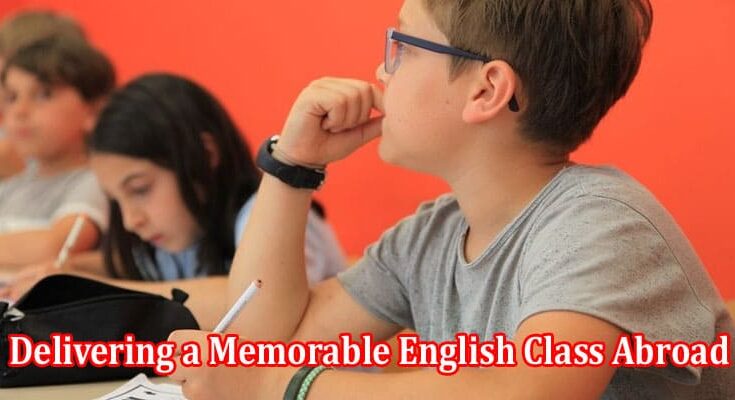A lot of people had a favourite teacher growing up. The reality is that that is something that most children have in their memory bank, whether it be a teacher that entertained them, or one that inspired them to chase their dreams or follow a particular career path.
Everyone has their own special teacher or teaching style that they remember fondly. Nowadays, one way to build on that is to think about becoming a TEFL (or Teach English as a Foreign Language) teacher. Below are some fast and simple tricks to make sure that every TEFL lesson is memorable and meaningful for all learners.
Get TEFL certified
Whether a TEFL tutor wants to teach English in South Korea, Spain, Qatar or anywhere else for that matter, getting a reliable and reputable TEFL certification is the best place to start. With courses that are full of top quality content, and up to the minute information on the mechanics of the English language itself, a TEFL program is the perfect platform on which to build core skills in teaching English.
Additionally, these courses are led by professionals, who have been around the block and know their stuff. They are on hand to answer any all questions related to the subject, and full of useful information to ensure the transition to the classroom is as smooth as possible.
High-quality TEFL certification is also internationally recognised, as recruiters can see the effort a TEFL teacher has taken to improve their skill set. A TEFL tutor who goes the extra mile to get qualified is far more likely to land a fantastic position more quickly and easily than those who are not.
Consider the audience
For some students, the TEFL tutor will be useful in different ways. Perhaps there is a group who needs assistance with writing their admission letters to academic institutions, and they just can not seem to grasp the finer details of writing academically in English.
Alternatively, some learners may have a lack of confidence in interacting with native English speakers, or even when listening to TV shows or films in the English language. For these reasons, and so many more, the TEFL instructor should pay attention to the unique requirements of the room, and adapt accordingly.
Another decision the TEFL teacher should make is the age group to which they wish to teach For instance, the type of lesson that would be fun and engaging for kindergarten learners is likely to be very different from the type of class that would work for high school students.
Use realia
Realia is a term that refers to bringing in outside objects or ideas, and placing them into the learning environment. This could be in the form of clothing that might be worn on special occasions, or even during a particularly cold season.
On the other hand, realia can also encompass cultural aspects and ideas that are less tangible, but still celebrate and acknowledge the background and heritage of the learners themselves. One such example is to look at contemporary art, such as paintings, sculptures, or even television programmes, that provide a talking point for students to dive more deeply into.
This can actually work both ways, as students are typically fascinated with the background of the TEFL teacher. Perhaps the TEFL educator can use this as an introduction to life in their own country, explaining points that may be of interest to the students as they navigate their way through the English language learning experience.
Organise a theme day
Whether it be food or drink related, or connected with a specific person who is famous in a culture, a theme day is a fantastic way to look into an aspect of history through the lens of English. On such days, students and teachers alike are encouraged to dress up in fancy dress costumes, and act out many of the facets of living that were typical of that era.
This could be to celebrate the life of a famous author, such as Roald Dahl, or even to hone in on a specific country, such as South Korea. In any event, the chance to teach a theme day is one that will probably live long in the memories of many learners, and enable them to connect even more clearly with the language points associated with the topic.
Theme days can also go so much further than conventional lessons, with special assemblies organised that can bring the whole school together. They can also showcase several aspects of the theme at once, from food and drinks, to music and songs, as well as clothing and artwork that fits the theme of the day.
Arrange a school trip
A school trip is a great way to make language learning come alive, and prove useful in the real world. Often, students have a challenge in converting all the wonderful content they learn in class into the outside world, and getting the authentic practice they need to feel comfortable in English.
Therefore, a school trip usually takes them away from much of the pressure these learners feel when attempting to refine their skills in English. What’s more, the school trips they take might just allow them to learn something new that can then be directly applied into their future English learning experience.
One other often forgotten aspect of a school trip is the journey to and from the site of the day itself. Many times, the bus or coach journey can be made interactive and exciting too, from fun games between teachers and students, all the way through to question and answer sessions that a typical lesson plan may not allow time for.
These help to strengthen the bond between students and TEFL instructors, allowing future learning to progress more easily as a result. This in turn ought to lead to a more harmonious study system, that works well for everyone all round.

Caroline is a dedicated writer with a passion for keeping readers informed. Specializing in providing the latest news updates and unbiased reviews, she strives to deliver accurate and insightful content. With a keen eye for detail and a commitment to journalistic integrity, Caroline ensures that her readers are always well-informed. Stay tuned for her latest articles to stay up-to-date on current events and trends.




